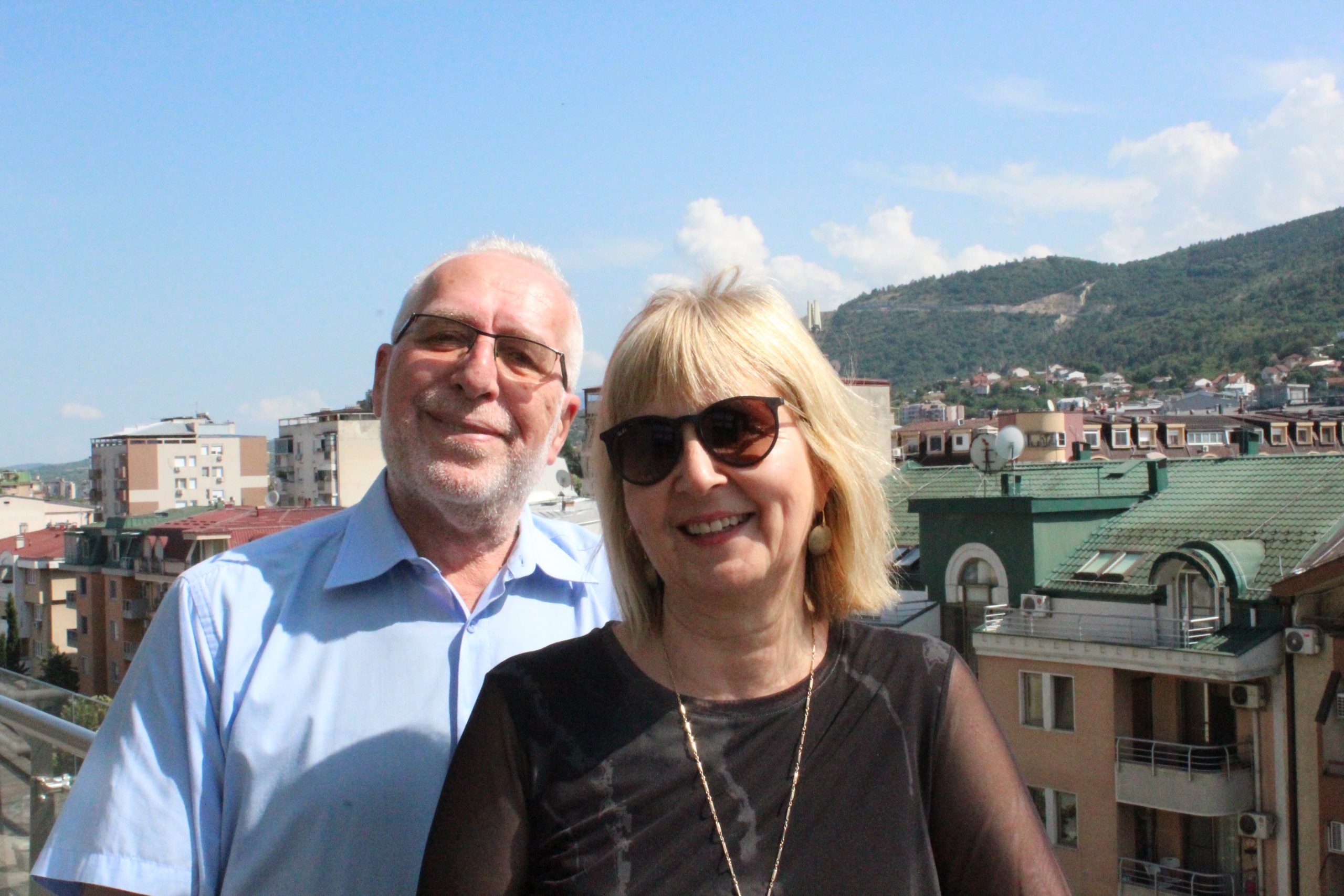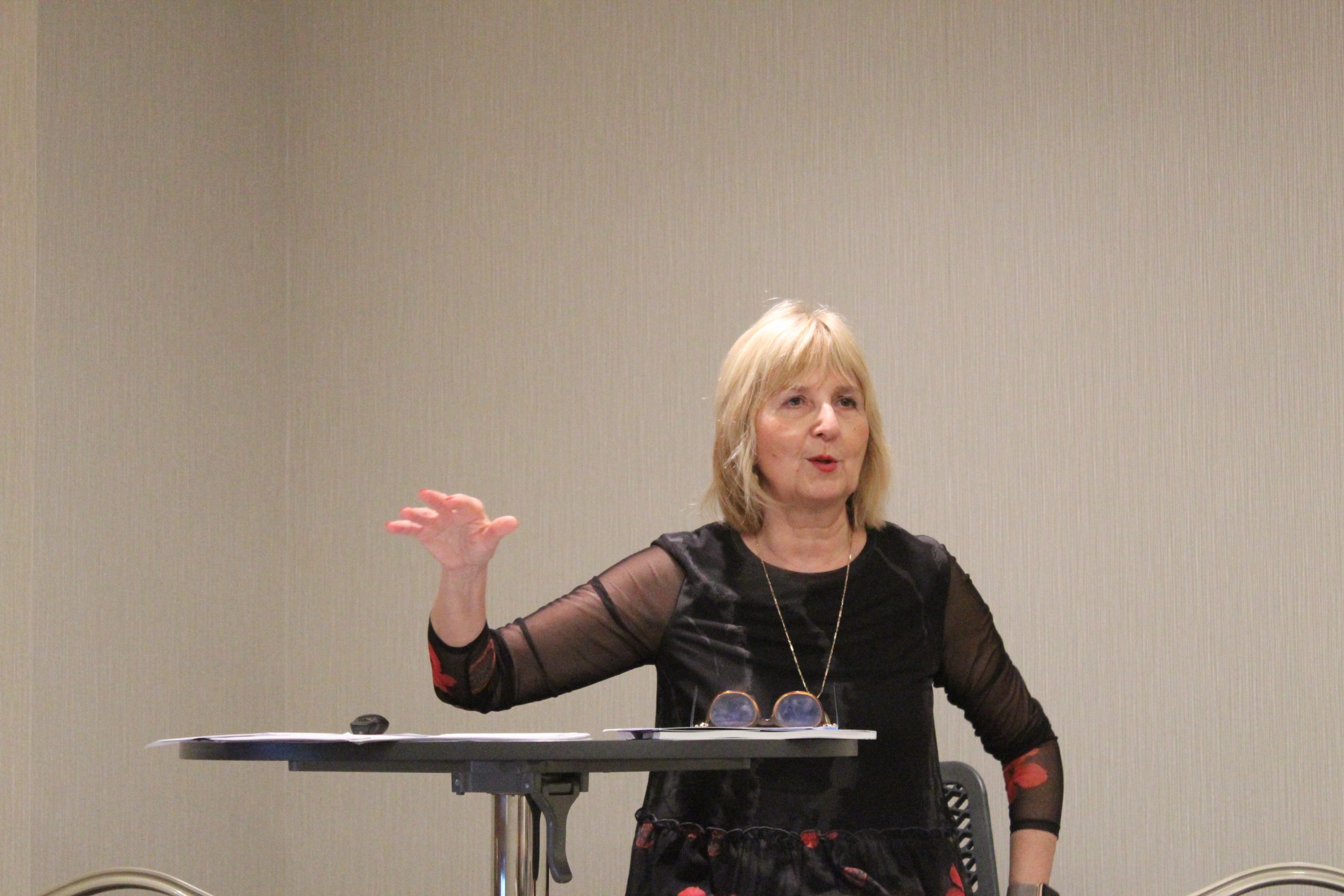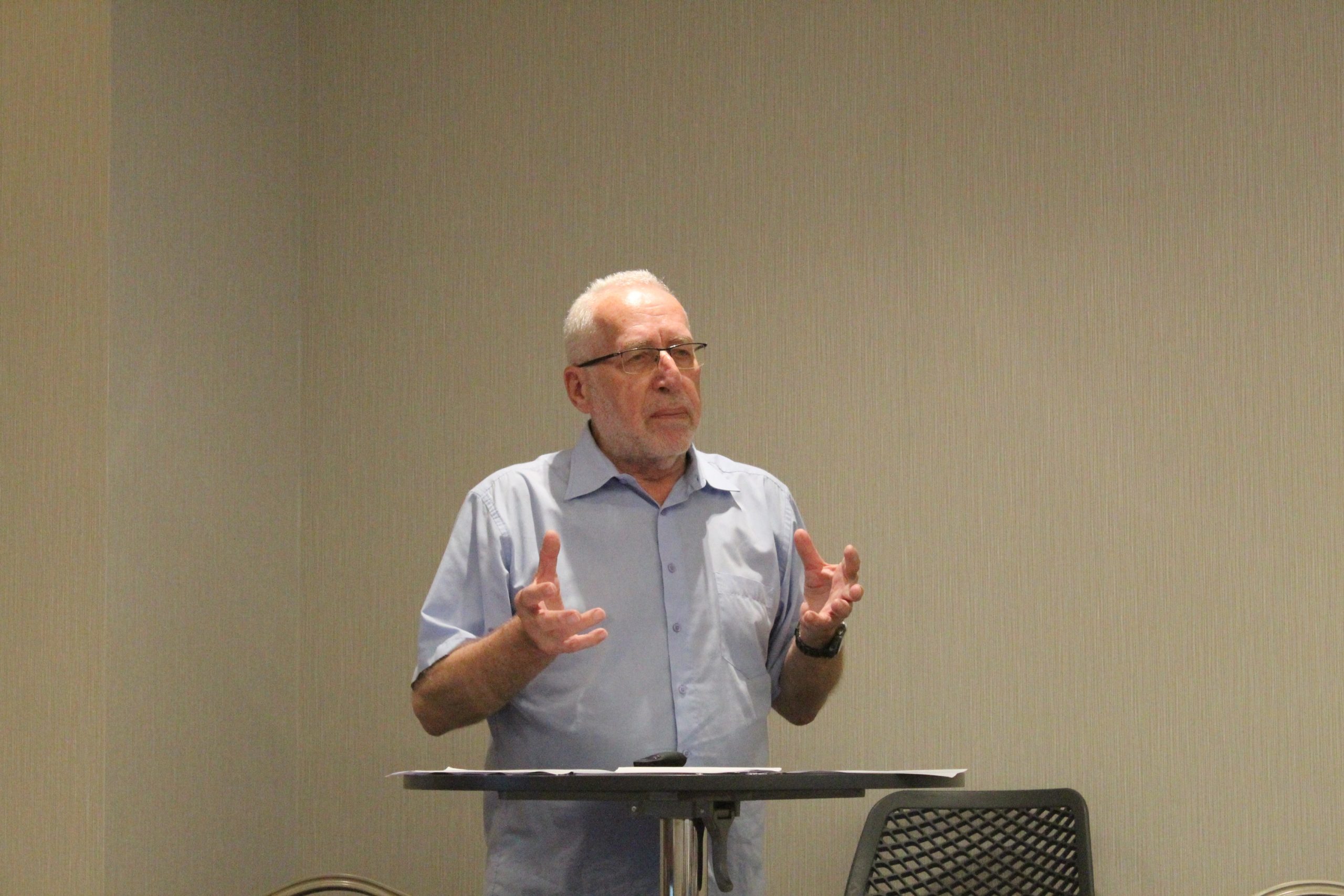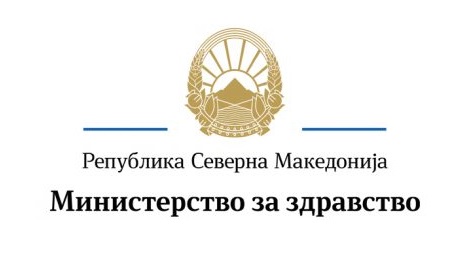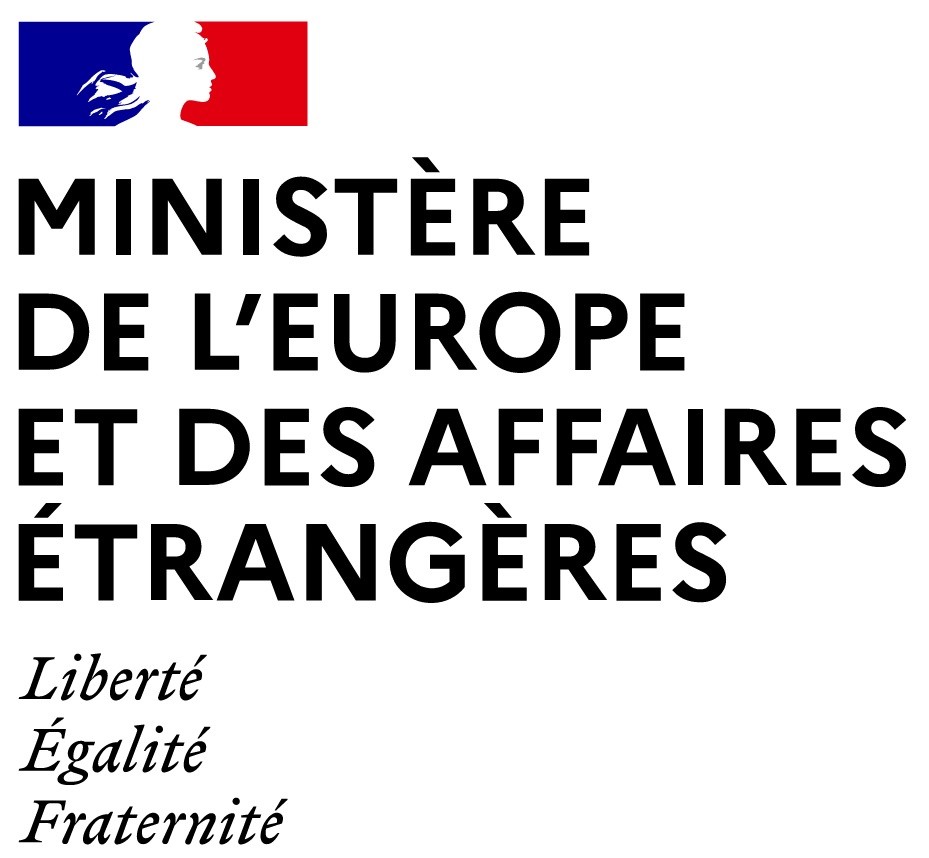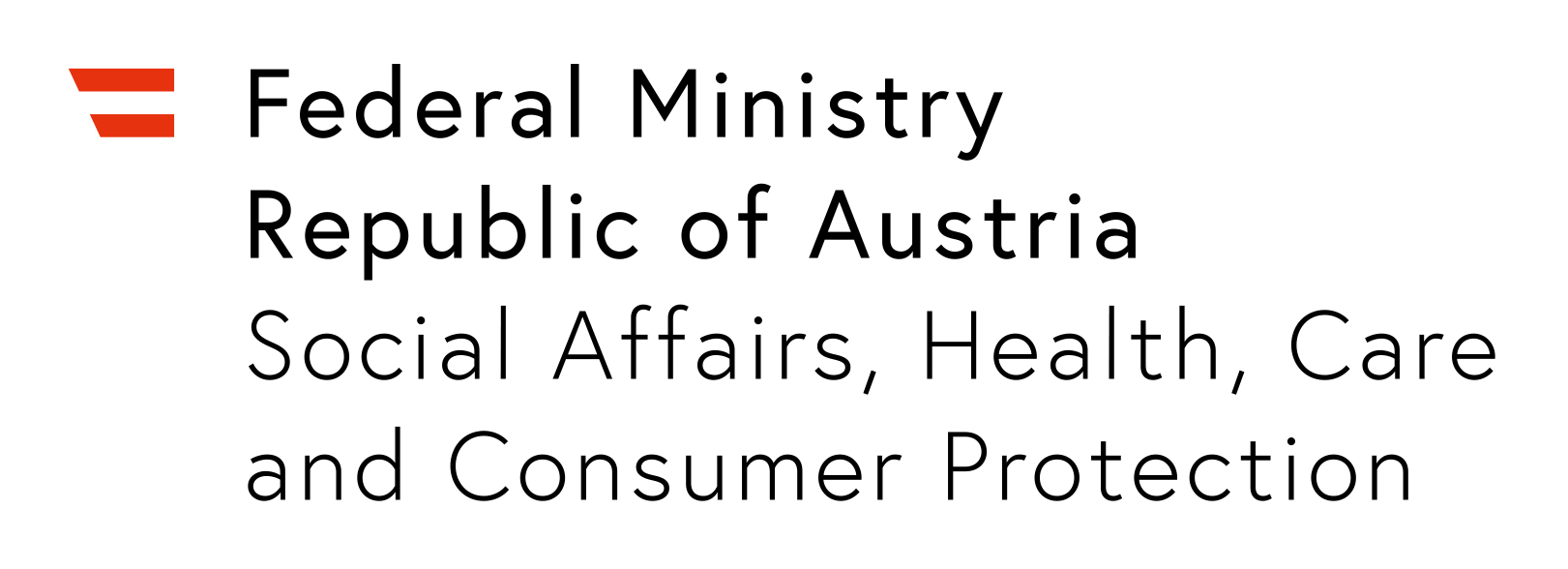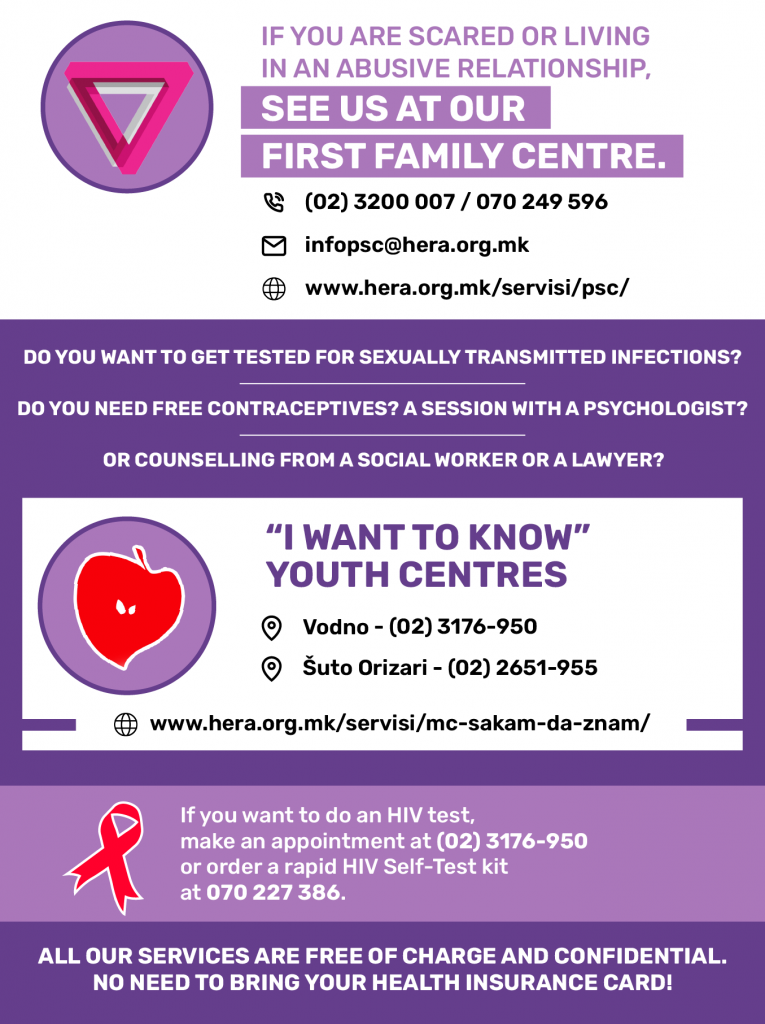Marina and Dean Andjukovič are a married and professional couple from Croatia who for more than 40 years have been working in the field of family and gender-based violence prevention, with a particular focus on violence in adolescent romantic relationships. They recently visited Skopje, and partook in the trainings organized by HERA within the project “Establishing multi-professional prevention of gender-based violence, working with perpetrators through an approach focused on the safety of the victim and counseling of men in North Macedonia”. This was a great opportunity for us to learn from them, as well as to conduct an interview.
HERA: You have been researching, educating and practically working in the field of preventing gender-based violence for many years. Considering that violence is ever-present, working on its prevention is necessary, but it is certainly difficult. What drew you to this field of work?
Marina: “As a psychologist, I have been working in the social welfare system for over 40 years, first as a practitioner and then as a teacher of social work studies. From the very beginning I gathered that the protection of children’s well-being is inseparable from the protection of mothers from violence and, in general, from the prevention of any form on violence in the family. But, I also realized violence against children is often just part of the violence that happens in the family. So, more than 20 years ago, as part of the Psychological Aid Society we published the first university textbook on the protection of women from domestic violence and started several programs we continue to develop to this day. It was very important to me to combine theory with and practice, so even though I work at a university, I am regularly involved in various practical field activities. Thanks to our efforts, students in the last year of their social work studies know what family violence is, how to recognize it, how to react and what should be done according to the law. In addition, we developed an optional subject that can be studied at a large number of faculties in Croatia.”
Dean: “I entered the field of protection against violence and prevention of violence in the family while I was working with refugees during the war in the early 90s. We gathered that there was much more violence present in a large number of the refugee families from Croatia and Bosnia and Herzegovina to whom we provided psychological support, than we had expected. We became interested in the causes, but also in the ways in which violence can be prevented and stopped. In those turbulent years this was practically impossible because everybody’s priorities were different. However, at the end of the decade, when things were starting to fall into place, better circumstances were created in which domestic violence was recognized as a social and public health problem. It was then when we started to deal with this problem much more seriously. Overtime, I developed a particular interest to work with perpetrators of violence in the family and against women, so together with Marina and a group of colleagues, we started educating ourselves – we had the opportunity to learn from some of the best experts from America and Europe. We adapted what we learned to the needs of the people in Croatia, we developed the first treatment program for perpetrators of violence, then an educational program which we improved over time. As the years passed, we helped develod a whole network of centers and helped train a large number of experts who can implement these programs. Later, through practical work we noticed that many of the violent relations between married partners, many of which had been together for a long time and had children, were violent even before the marriage started. Considering the fact that many of these violent relationships could have been stopped much earlier, we also developed a program for the prevention of violence in adolescent romantic relationships”.
HERA: Why is violence gender and not sex-based?
Dean: “The root of the violence against women and in the family is the inequality between men and women, or the gender inequality that doesn’t stem from biological differences. Simply said, this inequality doesn’t stem from the physical differences between the male and female reproductive organs, but from how boys and girls are socialized and brought up. From a young age they are taught which social roles are acceptable for them, and thus they – men and women- are restricted to what they can and cannot do. There are dozens of examples of this, and one of them is the different approach to education and the freedom to choose a certain type of education, which isn’t only typical for Croatia and Macedonia, but also for Europe, if not for every country. In other words, during schooling, boys are encouraged to study natural sciences, mathematics, technology, while girls are encouraged to work in caring and helping professions. This is why we have so many female teachers in schools and kindergartens and nurses in hospitals. Those are the so called “male” and “female’ professions. This is a complex process based on patriarchal values that each society has to a different extent. According to these values, a man – just because he is a man – should have more social power, his word should be the last in the home and he can allow himself certain behaviors that the women in the family can’t, for example being violent in order to ‘bring the put of the family in order’.”
Marina: “We are biologically different, and are therefore not the same, but we should be equal and have the same rights. But on top of those biological differences we now have the patriarchal viewpoint of the world, which restricts women, but also men. Men are restricted from enjoying their fatherhood, putting their trust in those they deem close and expressing their feelings. They are forced to stick to this toxic form of masculinity no matter what. Occasionally, I follow the ongoing of the feminist movement and even though I believe motherhood to be a gift, fatherhood should not be taken for granted. Men should have to opportunity to experience being fathers to the full extent, and therefore we should always work as a couple, so that we ourselves don’t enter into some of these stereotypes. We know we are on the right track when the group no longer talks about male or female responsibilities, but about domestic, parental responsibilities. It might seem like a small thing, but when we hear it we look at each other and we smile with our eyes, because we realize that we have finally left that stereotype behind.
We participated in a study, in which Macedonia also took part in, on violence against children, that showed that gender differences start around 11, 13 and 16 years of age. At the age of 11, boys receive more beatings, at the age of 13, both boys and girls are equally beaten, and at the age of 16, girls receive more beatings than boys and this has been confirmed by several studies. Every fourth 16 year old girl is a victim of domestic violence where the perpetrators of violence are both the father and the mother. Mothers tend to inflict more psychological abuse than fathers. The goal is to force the girl to accept a traditional role in the family. Arguments arise over the time of curfew, the choice of clothes and physical appearance, the choice of education…So, at 11 years old girls are still seen as little princesses and nobody teases them, at 13 years old they start to rebel and at 16 they are expected to fit in the gender roles that their family has imposed on them. This is exactly why I believe the prevention of gender-based violence should start in the educational system, and the parents themselves should teach their children to be non-violent by not using violence as a common form of discipline and by not contributing to harmful stereotypes.”
Dean: “I would just like to add one more thing that we often forget about, or think only applies to other, distant cultures, and that is the preservation of the family reputation and honor. What Marina mentioned, about how violence against girls increases over the years, is often justified by defending the family honor. So we often hear ‘don’t let others talk about the way you’re dressed or what you look like, who do you hang out with, when are you coming home’ and so on. What we often forget is that sometimes the family takes it as their right to use violent methods of upbringing in order to preserve their reputation and honor. Family reputation is, of course, an important thing for most people, it is a part of their identity. But the question arises, how can this reputation be preserved without using violence? If we want to achieve this, we need to teach children to not partake in violent actions and how to build a positive self-image”
HERA: During your lectures, we pointed out the fact that men are the perpetrators of violence in 80% of cases, that is, in 100% of cases of femicide (when the violence has fatal consequences for the victim). From here on, we can conclude that even though specialized counseling centers for women are necessary, they are only part of the solution. Why is it important to work with perpetrators of violence?
Dean: “Domestic violence is a complex phenomenon. People, however, tend to simplify the causes and solutions. Therefore, it is not uncommon for alcohol to be used an excuse for somebody’s violent behavior. We know that this is not true, since there are many people who drink alcohol and are not abusive, as well as people who don’t drink alcohol and are. But this is just one example of how things tend to be simplified…
There are four approaches to dealing with domestic violence. The first is turning to the law, the police, the juristic system, public prosecution, and to a degree the center of social work. The second are organizations working with victims of domestic violence, the center for social work which helps with counseling as well as civil organizations that offer such services and run shelters. The third is working with perpetrators of violence, because if we don’t work with them, they won’t be able to learn how to stop their violent behavior and take responsibility for their actions nor will they learn how to express their needs in their relationships or in the family in a non-violent way. And in that case, if we don’t work with them, even if they are fined or imprisoned, they will not change because there will be nobody to guide them through that change. The fourth approach is the public opinion. By raising awareness of what abuse is and why it exists, more support will be given to those who are directly affected by it or who work in that field. Thus, there will be a higher initiative to change policies and laws that regulate and sanction violent behavior in our society. Dealing with violence can be successful only when all of these approaches are implemented and well connected to each other.
Marina: “I have to add that through the years we decided to develop a work program with perpetrators of violence because of the women themselves. These programs require lots of financial and human recourses, which are often taken from the funds provided for the protection of women. However, it has been shown that most women simply want to stop the violence and not, and not necessarily end the relationship or ask for the divorce from the perpetrator. On the other hand, even if we help a woman safely leave a violent environment, and not work personally with the perpetrator, it is likely that he will find a new victim. When establishing effective protection, one must also work with the perpetrators of abuse and strive to change the attitudes and values in our society. I often recall the Convention for the Protection of Children’s Rights and rethink what each of its enactments mean in today’s day and age. At the same time, we must not forget the Istanbul convention, which clearly states what needs to be done if we want to provide effective protection not only for women, but also for children. Hence, the role of civil society organization in this matter became clear to us. A large number of civil sector organizations not only actively contribute to positive change when it comes to women’s rights and gender-based violence, but are also extremely important in providing services and developing new programs, something that, for various reasons, cannot be done by the state sector (centers for social work, the judiciary and the police). Civil associations are the ones who make the change, so everything we have implemented, we implemented as the Society for Psychological Assistance – a civil organization. Regardless, partnership with the public sector is necessary, and the civil sector is an important partner.”
HERA: It is often believed that the perpetrators of violence are dealing with mental health problems. But is this actually true?
Marina: “This is a myth. That doesn’t mean that amongst perpetrators there aren’t any with mental disorders, but it not dominant enough for us to generalize. On the other hand, even when perpetrators are violent because of mental health problems, it is society’s obligation to help them. In all of the regions affected by the war in 1990s, there are men living with post-traumatic stress disorder, which often manifests itself through lack of behavioral control and aggression. This tells us that these people, as well as their partners, are in need of help. It also means it is our responsibility to give them access to places where they can report this behavior and work on bettering it. The biggest challenge are people who have a borderline personality structure and in whom the fear of abandonment, the fear of losing their partner is so great that they are ready to do just about anything to preserve what they believe belongs to them. This is exactly why I think it is crucial to implement some preventive programs for emotional regulation, starting from kindergarten and primary school, because that is the only way we can be successful in the long run. I would like to emphasize that the role of the environment itself is very important. If the people around a young man notice that he is obsessed with someone, is stalking someone and sending constant messages, they should offer support to the potential victim, that is, they should know where to direct her for help to reduce the risk of violence. With post-traumatic stress disorder, it can be systematically affected, and with the latter, we have to follow the signs, the indicators and the police must be notified of the violent behavior that young men exhibit. It is easy to say that all perpetrators of violence are simply psychopaths in nature. This is yet another example of oversimplifying the reasons and solutions. This is exactly why we need to work on analyzing femicides and develop better strategies on the protection of potential victims. And to add, it is very important for the doctors, especially psychiatrists, to ask their mentally ill patients about their romantic relationships and parenthood. Some colleagues of mine have told me that up until they started working with me, it never occurred to them to ask their patients about their marriage or children. This shows us that doctors too need a clear protocol on how to act when they start working with this group of people.
HERA: Your work also focuses on violence in adolescent romantic relationships. What are the key insights you’ve come up with so far?
Dean: “It is very important to recognize violence in adolescent romantic relationships, for that can have very bad consequences later on. When two young people are in love, they want to spend time together and share everything with each other. They experience strong emotions. Being in love is a wonderful feeling, it’s the feeling of being drunk, because often we misjudge the situation in the beginning and that’s all part of life and growth. However, we have to emphasize that regulating the relations between these young partners is a completely new experience for them. They know how to behave in close relationships with their parents and siblings, their friends, but when it comes to romantic relationship it’s very different feeling, and most of the time they don’t know how to deal with that. On one hand, they want to be together as much as they can, but they wouldn’t like to lose their individuality, their time or their interests. A common example is when a boyfriend announces to his girlfriend that he will be spending the weekend with his friends, playing football or going fishing, which will result in the two of them not being able to see each other for a longer time period, because of school, responsibilities and so on. Or the other way around, let’s say the girl wants to spend Saturday night with her girlfriends, which makes him believe she doesn’t love him enough and tells her not to do that. So, they experience mutual attraction, but also want to preserve a part of their life before them, a part that’s individual to them. This is where conflicts and disagreements begin, and because of one’s behavior, the other may feel hurt or not enough loved. They may try to regulate this in many ways – with insults, blackmail, manipulation, but often alongside the psychological violence, there can be physical as well. Of course, dealing with these issues becomes harder because of the myth of an ideal romantic love that is stronger than anything else. Take for an example the story of Romeo and Juliet – despite everything they believe they can succeed, but we know exactly how their love story ends. Their story is just one of many that convince us love always prevails. But if we step away from this dream, then in the name of love we learn to make compromises, and the side that is weaker, accepts things that he or she in fact doesn’t like. These things can include spending more time with their significant other that they want to, or accepting behaviors that they otherwise wouldn’t tolerate, including sexual activities or associating with undesirable people, in other words doing things that cross their boundaries. All of this happens bit by bit, because of love, and slowly physical violence may occur. A slap, being pushed or grabbed by the hair are common violent behavior that for that age is often mutual. In the beginning both sides have the same amount of power, and both girls and boys can be equally violent. However boys tend to usually resort to physical violence and girls to psychological.
Marina: “We have to go back to the topic of children’s upbringing. The more children are unsure regarding the relationship they have with their family, the more likely they are to be victims, but also perpetrators of violence later in life. The relationship that is built between the parent and the child is an important foundation when it comes to asserting boundaries, and to leave a relationship when thing don’t go as planned, knowing that we will have the support of our family. The support of our parents is essential for everything, including these types of situations, as well as the willingness of young people and parents to talk openly on these topics, and to know they will come to an understanding”
HERA: On the topic of romantic relationships, ley’s also mention situational violence. Is it the same as gender-based violence?
Marina: “Situational violence happens when we attempt to resolve a problematic situation , but due to a lack of communicative skills, we get into a fight and don’t know how to stop ourselves. It’s different from gender-based violence because it does not necessarily stem from the idea that women shouldn’t have certain rights, but it is a conflict in which two people do not have the capacity to talk it out and violent behavior occurs. In these cases however, neither partner is afraid of the other, and neither is scared that the other will, for example, take away their children, take away their phones or their salary. Situational violence has far fewer gender aspects than gender-based violence. There is no imbalance in power – neither physical nor economic nor psychological – and the problem are the strategies chosen to fix a certain problem or stressful situation. People who engage in situational violence are generally people who cope poorly with stress in certain situation, but this behavior has nothing to do with the violent behaviors that we see as examples of gender-based violence”
HERA: Could comprehensive sexual education (CSE) be one of the possible systemic solutions to prevent and reduce gender-based violence, especially peer-to-peer violence? If it can be, why does the Church and the anti-feminist movement that exists in Croatia, and soon also in our country, fiercely fight against the de-tabooization of these topics and supports the patriarchal education that is harmful to men and boys themselves?
Marina: “The traditionalization of our society took place under the idea of national awareness, which applies to all countries in our region. The Church, of course, wants to defend its position. The Church is a supporter of gender-based stereotypes and inequality between men and women, and any discussion and questioning of the assigned gender roles is seen as a threat. It is in the Church’s interests for the woman to be submissive, for her sexuality to be regulated solely for the purpose of reproduction, all for the sake of maintaining that power, or in other words, the fear of losing that power. The public opinion changes so quickly that the least we can do is talk about rethinking the roles we have imposed in our society. On the other hand, we have young people, who aren’t millennials but Gen Z and are highly influenced by the internet. They have poor communicative skills or very few opportunities to resolve conflict in the real world, and they essentially crave for close relationships and connections with others. I really don’t understand how the Church doesn’t understand that if we don’t talk to young people about healthy relationships and dynamics, we would have an even more serious demographic crisis than we do today.”
Dean: “When it comes to comprehensive sexual education, it can be a very sensitive topic. Sexuality is a private matter, but as we can see it is becoming a religious and even political one. But in essence, I think there are many fake or exaggerated points surrounding CSE, that are deliberately placed in order to create a false image of young people being taught to engage in early and irresponsible sexual relations. This is simply untrue. Sexuality is an important part of our personal identity, and it is a natural thing for every human being. CSE is about a lot more than sexual relations – it covers topics crucial for the identity of each individual, topics surrounding the changes we experience during puberty and adolescence, which are not only physiological but also psychological and social. It teaches children about the differences that exist between people, such as sexual identities, preferences, and that means being taught about human rights and how those who don’t fit in the traditional role can have a terribly difficult life. If more young people understand how life for their friends who aren’t, for example, heterosexual is, they might value human rights a bit more.”
Marina: “We don’t take into account the average age at which girls first start their period in Croatia has dropped from 17 to 11 years of age in the past 100 years. Today we have young people for whom the difference between sexual and emotional maturity has become so great that it is crucial to talk about it. Back in the day, young people used to get married at 17-18, which was around the same time girls got their first menstruation. Today, this has all changed due to unhealthy food, environmental pollution and harmful plastics that affect hormones. This causes our whole biology to change, and yet we act as if nothing is happening. The way the church is behaving is less important, but it is especially alarming that the public health sector is silent, that there are almost no doctors who are saying ‘hey, this is what our statistics are like, and we have to somehow help these young people and their parents’, and how could we do that better than through the school?”
*The project “Establishing multi-professional prevention of gender-based violence, working with perpetrators through an approach focused on the safety of the victim and counseling of men in North Macedonia”, implemented by HERA, is supported by the Association for Men’s and Gender Issues Styria, Graz, Austria and has financial support from the Austrian Federal Ministry of Social Affairs, Health, Care and Consumer Protection.

